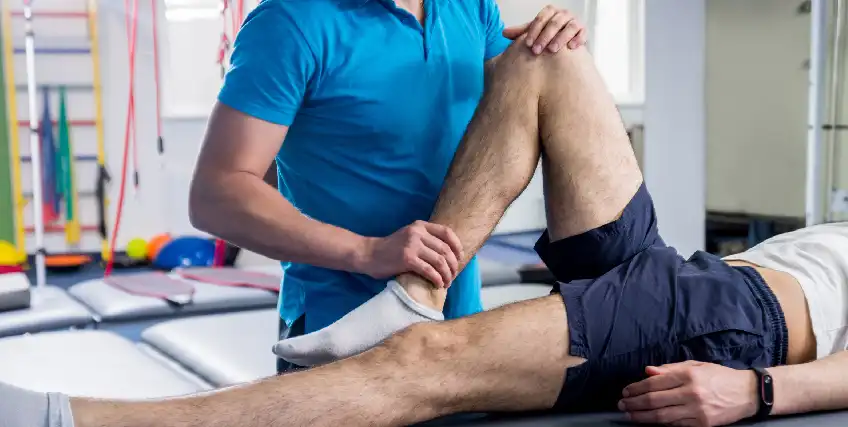Startup Loans for New Physical Therapy Practices
August 05, 2025 | Last Updated on: August 06, 2025

Great physical therapists may feel that the next logical step in their career development is opening their own physical therapy practice. But while you’re well-versed in patient care, you’re a new small business owner, and navigating the landscape of launching a new business can feel daunting — especially if you’re short on capital.
Like many business owners, you may need to find financing for physical therapist practices. Fortunately, you have many options when it comes to startup loans for new physical therapy practices. Although it can be difficult to find financing options in healthcare, this guide will equip you with the knowledge and resources to secure the necessary funding.
In this article:
- Understanding the common startup costs based on physical therapy industry analysis.
- The types of startup loans for new physical therapist practices that may be available to you.
- Tips to improve your qualification criteria for physical therapy practice funding.
Common Startup Costs for Physical Therapy Practices
Before you even think about startup loans for new physical therapy practices, you need a clear picture of how much money you'll actually need. The cost to start a physical therapy practice can often cost $100,000 or more, so you’ll need a detailed understanding of your startup costs. These expenses can vary significantly based on your location, the size of your practice, and the range of services you plan to offer.
The costs you’ll need to prepare for before applying for startup loans for new physical therapy practices include:
- Real estate: You’ll need a location, which will require either buying a spot with a commercial real estate loan or paying significant upfront lease costs. Plus, you may have to modify or renovate the space to suit your needs.
- Equipment and supplies: Specialized exercise equipment, therapy equipment, ultrasound machines, diagnostic tools, office furniture, computer hardware, and initial physical therapy supplies can add up quickly.
- Licensing and insurance: You’ll need your physical therapy license, of course, but you may also have to secure business licenses and permits for your location. Plus, you’ll need insurance policies for malpractice, general liability, property, and workers’ compensation if you plan on hiring people.
- Staffing: You may be able to address core business needs working on your own, but as you grow, you’ll need to hire more therapists, office administrators, and more.
- Marketing: Customer acquisition is crucial for any startup. Building a website, putting ads out in local print, and creating business cards and brochures all cost money.
- Working capital: You need general working capital to cover your initial operating expenses. It’s ideal to have at least three to six months of working capital available until your business revenues stabilize.
Types of Startup Loans for New Physical Therapy Practices
Once you have a solid grasp of your startup costs, it's time to explore financing options. There are several types of loans available for new physical therapy practices.
Term loans
The most common type of business loan, term loans provide a lump sum of money upfront in exchange for monthly payments based on an interest rate. Practice owners can use these funds to meet all kinds of specific needs.
Traditional banks and credit unions, however, tend to be less willing to work with startups than online lenders. While online lenders have less strict eligibility requirements and credit approval processes, that often comes at the cost of higher interest rates. Nonetheless, alternative lenders may be better options for startup loans for new physical therapy practices.
Small Business Administration (SBA) Loans
SBA loans are often considered the gold standard for small businesses due to their favorable terms, lower interest rates, and longer repayment periods. The SBA works with lenders to provide a partial guarantee for funds, meaning they will promise to repay part of a loan if a borrower defaults. That reduces the risk for lenders, making it easier for businesses to qualify.
Getting SBA startup loans for new physical therapy practices can still be difficult, however. The SBA tends to have strict eligibility requirements and a rigorous application process that will thoroughly vet your business plan and financial statements.
If approved, however, SBA loan programs like the SBA 7(a), Microloan, and 504 program each can provide loan amounts to support your startup needs.
Business Lines of Credit
A more flexible and accessible option for many startups, business lines of credit are part term loans and part business credit cards. A lender approves you for a maximum loan amount that you can draw funds from as needed. Rather than a term loan, you only pay interest and fees on what you use, giving you a safety net to bridge cash flow fluctuations or cover unexpected expenses.
Equipment Financing
Getting startup loans for new physical therapy practices can be difficult, but equipment financing tends to be very accessible. That’s because equipment loans use the equipment itself as collateral to secure the loan. This not only makes it easier to qualify for the loan, but can help you get lower interest rates.
Resources to Help Craft a Strong Business Plan
Your business plan is the most important part of your loan application when applying for startup loans for new physical therapy practices. This living document outlines your vision, strategy, and financial roadmap. When you have relatively little business experience and no business credit, it’s absolutely vital to have a great business plan.
Some resources to help you improve your business plan include:
- SBA: The SBA offers extensive free resources, including business plan templates, step-by-step guides, and a startup cost calculator. They also have information on market research and competitive analysis. Their "Plan your business" section is a great starting point.
- SCORE: This SBA-supported non-profit offers free mentorship from experienced business professionals who can guide you through the business planning process.
- American Physical Therapy Association (APTA) Private Practice Section: APTA provides resources specifically tailored to physical therapy clinic owners. From articles on starting a practice to marketing resources, it can help you tailor your business plan to the industry.
- Local Small Business Development Centers (SBDCs): SBDCs offer free, confidential business consulting and training. They can help you with all aspects of your business plan, from market research to financial projections. You can find your local SBDC through the SBA website.
How to Boost Your Startup Loan Approval Chances
Securing a startup loan for new physical therapy practices requires careful preparation. Here are some tips to help you improve your approval chances:
- Develop a strong business plan: Whether you’re looking for short-term working capital loans or major term loans, lenders want to see that you've thought through every aspect of your business. A well-researched business plan demonstrates your commitment and reduces perceived risk.
- Strong personal credit score: New businesses usually don’t have business credit scores, so the owners’ personal credit history matters. A strong personal credit score can put you in better shape for approval.
- Demonstrate industry experience: Your license as a physical therapist is a great start, but your business plan should also highlight any management experience, even if it's not directly in clinic ownership.
- Consider collateral or down payments: Offering collateral for a secured loan or putting down a significant down payment may be a good way to improve your chances of being approved for startup loans for new physical therapy practices.
- Compare lenders: Explore different lenders, including community banks, credit unions, and SBA-approved lenders to compare interest rates, terms, and fees.
- Consider a co-signer: If your personal credit or financial history isn't strong enough, a co-signer with excellent credit could improve your eligibility.
Final Thoughts
Getting startup loans for new physical therapy practices may not be easy. But that doesn’t mean you can’t do it. If you have a great business plan, and the passion and expertise to execute it, you may have more loan options than you think. Always compare multiple lenders to get an idea of what’s available and improve your loan chances by presenting an outstanding business plan and a well-organized loan application.
FAQs About Startup Loans for New Physical Therapy Practices
What are the typical startup costs for a new physical therapy clinic?
Startup costs for a new physical therapy clinic can range widely. Costs will depend on your location, the size of your clinic, and more.
What types of loans are best for a new physical therapy practice?
You may struggle to get startup loans for new physical therapy practices from traditional banks, but conventional loans from online lenders or SBA loans may be attainable. While alternative online lenders offer faster funding, their interest rates are typically higher.
How can a new physical therapy practice improve its chances of getting a loan approved?
Some ways to increase your chance of loan approval include developing a comprehensive business plan, demonstrating relevant industry experience, and being prepared to provide collateral and/or a down payment.
Are there resources to help me get startup loans for new physical therapy practice?
Some resources to help you with your business plan include the U.S. Small Business Administration website, SCORE, your local Small Business Development Center (SBDC), and the American Physical Therapy Association (APTA) Private Practice Section.
Are there specific grants available for physical therapy practices?
Direct grants for starting a general private physical therapy practice are rare. Most grants are often tied to specific research, educational programs, or initiatives serving underserved populations, rather than general startup capital for a for-profit clinic. However, you can explore potential government support programs for small businesses, especially if your clinic serves a rural or underserved area.



